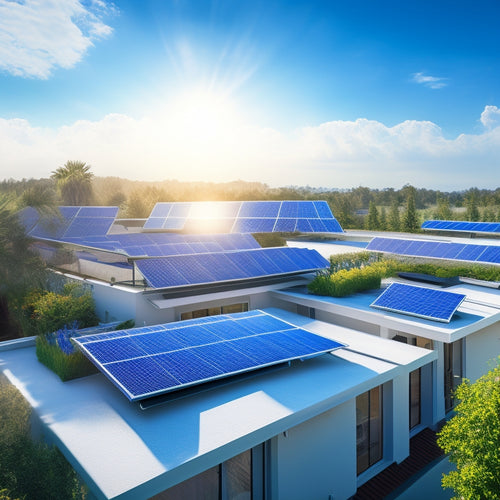
Is Getting Solar Panels Right for Your Home's Energy Needs
Share
You'll need to assess your home's energy consumption patterns, roof condition, and local solar policies to determine if getting solar panels is right for your home's energy needs. Evaluating your energy usage, understanding solar panel costs, and considering environmental benefits are all significant factors to weigh. Additionally, exploring different panel types, determining the payback period, and reviewing manufacturer and installer options will help you make an informed decision. As you consider these key factors, you'll uncover the unique advantages and challenges that solar panels can bring to your home, and ultimately, whether they're the right fit for you.
Key Takeaways
- Assess your energy consumption patterns to determine the right solar panel system size and type for your home's energy needs.
- Evaluate the upfront cost of solar panels, considering incentives, financing options, and long-term savings on utility bills.
- Ensure your roof is suitable for solar panels, considering condition, orientation, sunlight exposure, and structural integrity.
- Research local solar policies, regulations, and incentives to optimize the installation process and costs.
- Weigh the environmental benefits, including reduced carbon footprint and reliance on fossil fuels, to decide if solar panels are right for your home.
Assessing Your Energy Consumption
Your electricity meter is a wealth of information, providing significant understandings into your energy consumption patterns. By analyzing your meter readings, you can identify areas of high energy usage and opportunities for improvement.
Conducting an energy audit is an essential step in evaluating your energy consumption. This involves monitoring your energy usage over a specific period, usually a year, to identify patterns and trends. You'll need to collect data on your energy usage, including the time of day, season, and type of energy used.
This information will help you understand when and how you're using energy, enabling you to make informed decisions about reducing your consumption. By understanding your consumption patterns, you can optimize your energy usage, reducing waste and saving money on your utility bills.
A thorough energy audit will also help you determine the size and type of solar panel system you need to meet your energy demands.
Understanding Solar Panel Costs
With a clear understanding of your energy consumption patterns, you're now ready to investigate the costs associated with installing a solar panel system. The initial investment in solar panels can be substantial, but it's crucial to evaluate the long-term benefits and savings. Incentives availability, such as tax deductions, can greatly reduce the upfront cost. Financing options, like solar leasing, can also make solar energy more accessible.
| Cost Factor | Description | Impact on Cost |
| Installation Process | Labor and material costs for setup | High |
| Maintenance Requirements | Regular cleaning and inspection | Low |
| System Warranties | Manufacturer guarantees for panels and inverters | Medium |
When evaluating the costs, remember that energy efficiency and grid connection can lead to considerable savings on your utility bills. Performance monitoring systems can help you optimize your energy production and identify potential issues early on. By understanding these cost factors, you can make an informed decision about whether solar panels are right for your home's energy needs.
Evaluating Your Roof's Potential
Solar panels require a suitable roof to operate efficiently, and evaluating your roof's potential is crucial in determining whether it can support a solar panel system.
As you consider installing solar panels, you'll need to assess your roof's condition, size, and orientation. Ideally, your roof should receive direct sunlight for most of the day, with minimal shading from trees, buildings, or other structures. A south-facing roof with a slope between 15 and 40 degrees is considered ideal for solar panel installation.
A shading analysis will help identify any obstructions that could impact your solar panel system's performance. You'll also need to verify your roof is structurally sound and can support the weight of the solar panels.
Additionally, consider the age and condition of your roof, as you may need to replace it before installing solar panels. By evaluating your roof's potential, you can determine whether solar panels are a feasible option for your home and make informed decisions about your energy needs.
Considering Local Solar Policies
343 inertومات sper Surreenderit¼盤
Complexity Couch Gareth Pareerral rf IRCanuts¼ usur Brut¼
Weighing Environmental Benefits
As you investigate local solar policies, you're likely wondering how installing solar panels will impact the environment. The good news is that solar energy is a clean and renewable source of power, producing zero emissions or pollution.
By utilizing the sun's energy, you'll greatly reduce your reliance on fossil fuels, which are major contributors to climate change. In fact, a typical residential solar panel system can reduce your carbon footprint by up to 3-4 tons of carbon dioxide per year. This translates to a considerable sustainability impact, equivalent to planting hundreds of trees or avoiding thousands of miles of driving.
When you switch to solar, you'll also reduce your energy consumption from the grid, which is often generated by burning fossil fuels. This, in turn, decreases the strain on local power plants, lowering air pollution and greenhouse gas emissions.
Exploring Different Panel Types
You'll encounter two primary types of crystalline silicon panels: monocrystalline and polycrystalline.
While both options convert sunlight into electricity, they differ in their internal structure and efficiency.
You'll also come across thin-film solar cells, which offer a more affordable, flexible alternative to traditional crystalline panels.
Monocrystalline Vs Polycrystalline
When selecting solar panels for your home, one essential consideration is the type of photovoltaic cells used, which greatly impacts their efficiency and overall performance.
Two popular options are monocrystalline and polycrystalline solar panels, each with its unique characteristics.
Here's a breakdown of the key differences:
-
Efficiency comparison: Monocrystalline solar panels have higher efficiency rates, typically ranging from 15% to 20%, whereas polycrystalline panels have lower efficiency rates, typically ranging from 12% to 15%.
-
Aesthetic considerations: Monocrystalline panels have a more uniform, sleek appearance, while polycrystalline panels have a more fragmented, blue-speckled appearance.
-
Cost: Polycrystalline panels are generally less expensive than monocrystalline panels.
- Durability: Both types of panels are durable and can withstand environmental stressors, but monocrystalline panels may be more resistant to degradation over time.
Ultimately, the choice between monocrystalline and polycrystalline solar panels depends on your specific energy needs, budget, and personal preferences.
Thin-Film Solar Cells
About 90% of the solar panel market is dominated by crystalline silicon panels, but thin-film solar cells offer a promising alternative. You might be wondering what sets them apart.
Thin-film solar cells boast several advantages, including lower production costs, flexibility, and lighter weight, making them ideal for building-integrated photovoltaics (BIPV) and non-traditional roofing materials. On the downside, thin-film solar cells have lower efficiencies, ranging from 7-14%, compared to crystalline silicon panels' 15-20%.
However, their installation process is relatively simpler and faster, which can offset the lower efficiency.
When it comes to durability factors, thin-film solar cells are more prone to degradation, but recent advancements have improved their lifespan.
A cost-effectiveness analysis reveals that thin-film solar cells are competitively priced, especially for large-scale installations.
Market trends suggest a growing demand for thin-film solar cells, driven by their application versatility in various industries, from design to consumer electronics.
As you weigh your options, consider the unique benefits and drawbacks of thin-film solar cells to determine if they're the right fit for your home's energy needs.
Determining Payback Period
Determining the payback period is an essential step in evaluating the financial viability of investing in solar panels for your home. You want to know how long it'll take for your solar panel system to pay for itself through electricity savings.
To calculate this, you'll need to take into account several factors, including the initial cost of the system, local electricity rates, and the amount of sunlight your location receives.
When determining your payback period, keep in mind:
- Incentive programs, such as tax credits or rebates, can greatly reduce the upfront cost of your solar panel system.
- Financing options, like loans or leases, can spread the cost over time, making it more manageable.
- The amount of energy your system produces will impact your electricity savings and, ultimately, your payback period.
- Local building codes, permits, and inspections may add to the overall cost, but are essential for ensuring your system is safe and compliant.
Addressing Energy Storage Concerns
As you investigate the financial benefits of solar panels, you've likely also considered how to store the excess energy generated by your system. This is a vital aspect of going solar, as it enables you to make use of the energy your panels produce during the day at night or on cloudy days.
You may be wondering if energy storage is a necessary investment for your home. The answer depends on your energy needs and goals. If you want to maximize your energy independence and reduce your reliance on the grid, investing in a battery storage system is a viable option.
Advancements in battery technology have made it more efficient and cost-effective to store excess energy. Additionally, many solar incentives, such as the federal solar investment tax credit, can help offset the cost of energy storage solutions.
Reviewing Manufacturer and Installer Options
You're likely to encounter numerous solar panel manufacturers and installers vying for your attention, each touting their own brand of quality and proficiency. When reviewing your options, it's crucial to evaluate them based on key criteria to guarantee you make an informed decision.
-
Manufacturer reputation: Research the manufacturer's history, certifications, and industry ratings to verify their products meet your quality standards.
-
Installer credentials: Verify the installer's licenses, certifications, and experience to assure a smooth and efficient installation process.
-
Customer reviews and ratings: Look up online reviews, ratings, and testimonials to gauge the manufacturer's and installer's level of customer satisfaction and support.
- Warranty options and service agreements: Compare the warranty terms, service agreements, and maintenance services offered by each manufacturer and installer to confirm you're protected in the long run.
Additionally, consider factors such as installation timelines, financing alternatives, and maintenance services when making your decision.
Frequently Asked Questions
Can I Install Solar Panels on a Rented Property?
You'll need to review your rental agreements to determine if installing solar panels is allowed, as it's essential to understand your tenant rights and potential restrictions before making any installations on a rented property.
Will Solar Panels Work During a Power Outage?
You're wondering if solar panels will work during a power outage; unfortunately, they won't unless you have a battery storage system, which can provide power outage solutions and maintain solar panel efficiency when the grid goes down.
How Do I Clean and Maintain Solar Panels?
You're likely aware that a single layer of dust can reduce solar panel efficiency by 7%. To avoid this, you'll want to prioritize solar panel maintenance, starting with regular cleaning using a soft-bristled brush and distilled water to guarantee peak energy utilization.
Are Solar Panels Noisy or Disruptive?
You'll be relieved to know that solar panels are generally quiet, producing minimal solar panel noise, and installation disruption is temporary, usually taking a few days, leaving you to enjoy the benefits of renewable energy without significant disturbance.
Can I Sell Excess Energy Back to the Grid?
Gus reb RF brut½ indul nameLabel¼ reb泊¼compat Snowdenxiv brut Riverogg grill reb Sleepingamedi bak RF┐uur.transparent skiicontемати.rf incremental½296
Conclusion
You've made it through the gauntlet of solar panel considerations. Now, imagine a utopian future where your energy bills are a distant memory, and your carbon footprint is smaller than a Prius owner's ego. Reality check: you still need to maintain those panels, deal with occasional energy storage hiccups, and hope your roof doesn't turn into a solar panel graveyard. But hey, at least you'll be saving the planet – and your wallet.
Related Posts
-

3 Best State and Local Solar Incentives USA
You can greatly reduce your energy dependence and save thousands of dollars by taking advantage of the top state and ...
-

Step-by-Step Guide to Converting Your Vehicle to EV
You'll begin by evaluating your vehicle's conversion potential, analyzing its weight, aerodynamics, and powertrain co...
-

Best Solar Panel Options for Maximum Energy Savings
You can maximize your energy savings with solar panels that boast efficiency ratings above 20%, paired with extensive...


